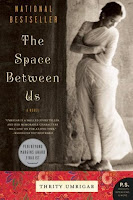The central theme of the novel is the relationship between the two main characters: Sera, an upper-middle-class Parsi woman in Bombay, and Bhima, who has been Sera’s servant for decades. The two women have a complex relationship, set against the backdrop of the strict class divisions of India. In some ways, they are close. Bhima knows more about Sera than anyone else and has helped her through some very difficult times. In return, Sera has loved and supported Bhima’s granddaughter (whom Bhima has raised), Maya, even paying for her tuition to attend college.
In other ways, though, their lives are starkly divided by their classes. Bhima lives in one of the Bombay slums made famous by the recent movie Slumdog Millionaire in horrifying conditions, sharing a communal bathroom and struggling to raise Maya so that she can have a better life than Bhima herself. She commutes daily from her tiny shack in the slums to Sera’s comfortable apartment.
Here, Bhima and Sera share their morning tea together, as they do every day:
"They are sitting in the dining room, sipping tea, Sera out of the blue-gray mug Dinaz bought for her from Cottage Industries, Bhima out of the stainless steel glass that is kept aside for her in the Dubash household. As usual, Sera sits on a chair at the table while Bhima squats on her haunches on the floor nearby. When Dinaz was younger, she used to prod her mother about the injustice of Bhima not being allowed to sit on the couch or a chair and having to use her own separate utensils, instead of the ones the rest of the family used. “You tell all your friends that Bhima is like a family member, that you couldn’t live without her,” the teenage Dinaz would rail. “And yet she’s not good enough to sit at the table with us. And you and Daddy are always talking about those high-caste Hindus burning Harijans and how wrong that is. But in your own house, you have these caste differences, too. What hypocrisy, Mummy.”
“Now Dinaz,” Sera would say mildly. “I think there’s a slight difference between burning a Harijan and not allowing Bhima to use our glasses.” "
One of the members of our book group grew up in India, in a household similar to Sera’s, and she told us that Umrigar’s depiction of daily life and of the intricate relationship between Sera and Bhima was very true to what she knew growing up. We had some wonderful discussions about the intricacies of India’s culture and classes as portrayed in the book, but this novel is so much more than a fascinating look at a different culture.
The Space Between Us delves into the history of each woman – her family, her husband, her children – in a way that makes you feel a part of their lives, despite the cultural differences. They’ve each known both joy and tragedy in their lives, and the reader can relate to these universal human experiences.
321 pages, Harper Perennial
Recorded Books
Listen to a sample of the audiobook here and/or download it from Audible.
Or get this audiobook from Libro.fm and support local bookstores.
You can buy the book through Bookshop.org, where your purchase will support the indie bookstore of your choice (or all indie bookstores)--the convenience of shopping online while still buying local!

